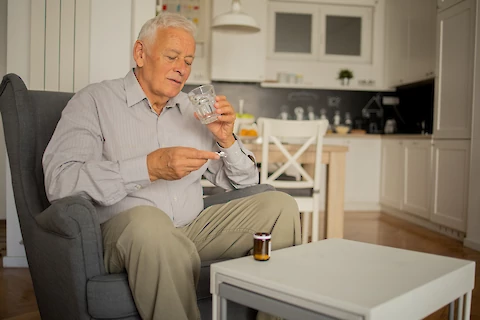
A well-balanced diet helps seniors maintain their energy levels, boost their immunity, and minimize the risk of various age-related health issues. It is important for family members and caregivers who manage meal planning and preparation to be aware of common vitamin deficiencies in seniors and address them through a nutritious and diverse diet. In this Senior Helpers blog post, we identify the top vitamin deficiencies in seniors and discuss what foods are rich in these essential nutrients.
Vitamin D
Vitamin D is vital for maintaining healthy bones and supporting a strong immune system. Seniors tend to have lower vitamin D levels due to a decreased ability to synthesize it from sunlight, making consuming enough of it through their diet even more important. Foods rich in vitamin D include fatty fish like salmon and mackerel, egg yolks, and fortified dairy products such as milk, yogurt, and cheese. Including these foods in meals helps boost their vitamin D intake and promotes better bone health and immune function.
Vitamin B12
Often referred to as the "energy vitamin," B12 is crucial for maintaining healthy brain function and supporting optimal energy levels. Unfortunately, many seniors struggle with vitamin B12 absorption due to age-related decreases in stomach acid production. Incorporating foods rich in vitamin B12, like meat, fish, poultry, dairy products, and fortified cereals, into your meal plans can make a difference. These nutrient-dense ingredients help seniors stay energized throughout the day.
Calcium
Seniors need to consume sufficient amounts of calcium since they are at a higher risk of developing osteoporosis. Dairy products like milk, yogurt, and cheese are excellent sources of calcium. Don't forget about other calcium-rich options like dark leafy greens (e.g., kale, and spinach) and fortified plant-based milk (e.g., almond or soy milk). These additions to your loved one's meals help keep their bones strong and protect them from the risk of fractures.
Vitamin K
Vitamin K plays a critical role in blood clotting and maintaining bone integrity. Seniors often experience a decline in vitamin K levels, which can increase their risk of developing osteoporosis and other bone-related issues. To help combat this deficiency, include vitamin K-rich foods like dark leafy greens, broccoli, and Brussels sprouts in your meal planning. These nutritious vegetables provide a substantial amount of essential nutrients and support healthy blood clotting and bone health.
Magnesium
Magnesium is involved in many essential bodily functions, including muscle and nerve function, blood sugar control, and blood pressure regulation. Many seniors may not consume enough magnesium-rich foods, putting them at risk for deficiencies. It is smart to incorporate magnesium-packed ingredients like nuts, seeds, legumes, whole grains, and dark leafy greens into your loved one's diet.
Tips for Senior Meal Planning
- Encourage colorful, varied meals — A diverse and colorful plate is more likely to provide a wide range of vitamins and minerals. Include a variety of fruits, vegetables, grains, and proteins in each meal.
- Opt for whole, unprocessed foods — Choosing whole foods over processed options ensures your loved ones get the maximum nutritional benefit from their meals.
- Consider fortified foods — Some foods are fortified with essential vitamins and minerals, making them excellent options for seniors who may struggle to consume enough nutrients through whole foods alone.
- Consult a healthcare professional — Discuss your loved one's specific nutritional needs with their physician or a registered dietitian to create the most effective meal plan for their unique needs.
Senior Helpers Can Help With Meal Planning
Addressing vitamin deficiencies in seniors is a critical aspect of maintaining their overall health and well-being. Senior Helpers offers comprehensive in-home senior care customized to help your elderly loved ones enjoy a healthier, more fulfilling life. If you live in St. Petersburg, Gulfport, South Pasadena, St. Pete Beach, or Treasure Island and need assistance with meal planning or caregiving, don't hesitate to contact Senior Helpers St. Petersburg. Our team of compassionate professionals is here to support you and your loved ones on their journey to optimal health.